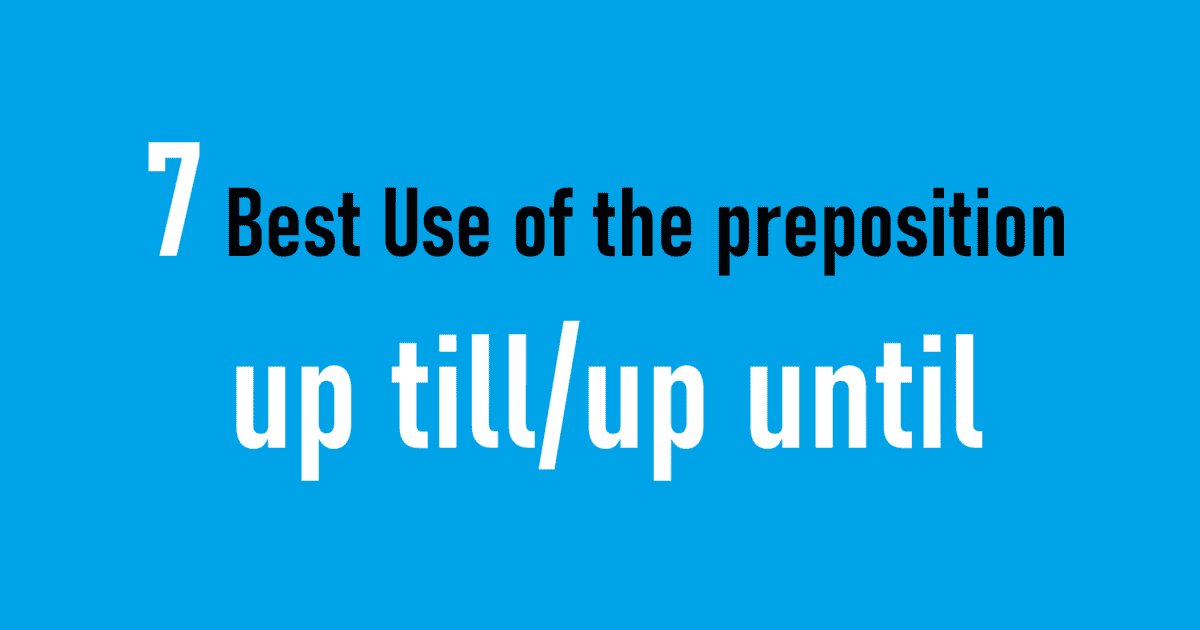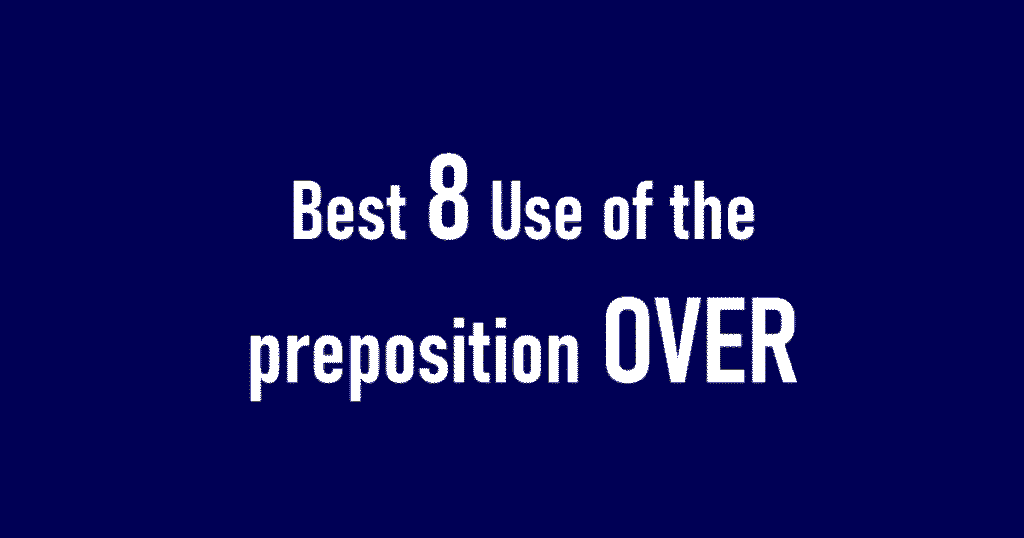Use of the preposition up till/up until. The English language is a fascinating tapestry woven with nuances and subtleties, and prepositions are often the threads that tie it all together. While seemingly simple, the correct usage of prepositions can significantly impact the clarity and precision of your writing and speech. Today, we’re diving deep into the prepositions “up till” and “up until,” exploring their meanings, usage, and subtle differences.
Use of the preposition up till/up until
Understanding the Basic Meaning: A Time Boundary
Both “up till” and “up until” serve as prepositions that indicate a point in time before which something happens or continues. They essentially establish a temporal boundary, marking the last point in time before a change or cessation occurs. In simpler terms, they mean “until” or “to.” They signify a duration leading to a specific point in time.
Think of it this way: imagine a timeline. “Up till” and “up until” point to a specific marker on that timeline, signifying the end of a period or activity. Whatever action or state you’re describing holds true before reaching that marker.
Examples to Illustrate the Point:
Let’s look at some examples to solidify the concept:
- “I worked on the project up till midnight.” (I stopped working on the project at midnight.)
- “She had been practicing piano up until the day of the concert.” (She stopped practicing piano on the day of the concert.)
- “The store will be closed up till Monday morning.” (The store will reopen on Monday morning.)
- “He believed everything he was told up until he witnessed the event himself.” (His belief ceased upon witnessing the event.)
In each of these sentences, “up till” and “up until” define the endpoint of an activity or belief. They establish the temporal limit of the action.
Are “Up Till” and “Up Until” Interchangeable? A Matter of Nuance and Context
While “up till” and “up until” often function interchangeably, subtle differences in usage and formality do exist. Let’s break down these nuances:
- Formality: “Up until” tends to be perceived as slightly more formal than “up till.” While both are acceptable in most contexts, “up until” might be preferred in formal writing, academic papers, or professional correspondence. “Up till” can sound more conversational and relaxed.
- Emphasis: Some argue that “up until” carries a slightly stronger emphasis on the finality of the time limit. The addition of “until” can provide a sense of definiteness to the endpoint.
- Regional Variations: The preference for one phrase over the other can also be influenced by regional dialects and speaking habits.
Practical Guidelines for Choosing Between “Up Till” and “Up Until”:
Here’s a handy guide to help you choose the right phrase:
- Formal Writing: If you’re writing a formal document, a research paper, or communicating in a professional setting, “up until” is generally a safer choice.
- Informal Communication: In casual conversation, emails to friends, or informal writing, “up till” is perfectly acceptable and often sounds more natural.
- Emphasis on Finality: If you want to strongly emphasize the end point of the duration, “up until” might be more suitable.
- Consider Rhythm and Flow: When in doubt, read the sentence aloud with both phrases. Choose the option that sounds more natural and flows better within the context of the sentence.
Common Mistakes to Avoid:
While “up till” and “up until” are generally straightforward, here are some common mistakes to watch out for:
- Redundancy: Avoid phrases like “up till the time until” or “up until the time until.” These are unnecessarily redundant. Choose either “up till” or “up until,” followed by the specific point in time.
- Misunderstanding with “Until”: While similar in meaning, “until” is a more concise option. In many cases, you can simply replace “up till” or “up until” with “until” without changing the meaning of the sentence. Consider the sentence, “I will be here up till Friday.” This can be simplified to “I will be here until Friday.”
- Confusing with “Up To”: “Up to” indicates a limit or maximum, not a time boundary. For example, “The cost could be up to $100” means the cost could be as high as $100, not that the price is valid until a certain time.
- Incorrect Tense Usage: Ensure that the tense of the verb aligns with the time frame indicated by “up till” or “up until.” For example, “I had been working up till midnight” is correct because it uses the past perfect continuous tense to indicate an action that continued up to a point in the past.
Examples with Correct and Incorrect Usage:
Let’s examine some examples highlighting both correct and incorrect usage:
Correct:
- “She studied diligently up till the exam.”
- “The website was under construction up until this morning.”
- “The rain continued up till noon.”
- “I hadn’t seen him up until yesterday.”
Incorrect:
- “I will work up until the time until 5 pm.” (Redundant: Should be “I will work up until 5 pm” or “I will work until 5 pm.”)
- “I have been working up to midnight.” (Incorrect meaning: “Up to” implies a limit, not a time boundary.)
- “He is living here up until last year.” (Incorrect tense: Should be “He lived here up until last year” or “He had been living here up until last year.”)
Beyond the Basics: More Complex Scenarios
In some instances, the choice between “up till” and “up until” can depend on the broader context of the sentence and the specific nuance you wish to convey. Consider these scenarios:
- Describing a Process: When describing a process that culminates in a specific event, “up until” might be more appropriate. For instance, “Up until the final vote, the debate was heated.” This emphasizes the build-up and tension leading to the final decision.
- Highlighting a Contrast: If you want to draw a stark contrast between a previous state and a subsequent change, “up until” can be effective. For example, “Up until that moment, he had been confident; now, he was filled with doubt.”
In Conclusion: Mastering the Art of Temporal Precision
“Up till” and “up until” are valuable tools for expressing temporal boundaries in your writing and speech. While often interchangeable, understanding their subtle differences in formality, emphasis, and context can help you achieve greater precision and clarity in your communication. By paying attention to these nuances and avoiding common mistakes, you can confidently wield these prepositions to paint a more vivid and accurate picture of events unfolding in time. Remember to consider the overall tone and style of your writing, and choose the option that best suits your specific needs and intentions. By doing so, you’ll be well on your way to mastering the art of temporal precision in the English language.
Read Also,
- Learn all prepositions
- Use of the preposition above
- Use of the preposition about
- What is Religion
- News in Hindi
- Human vs AI
- Very Important Word Lists
>>> Sir Sahil


